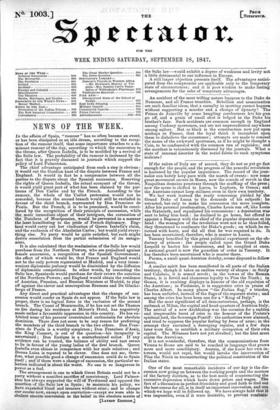If the rulers of Italy are of accord, they do
not as yet go fast enough for the people, and the progress of the peaceful revolution is hastened by the popular impatience. The record of the jour- nalist can barely keep pace with the march of events : now some great movement occurs in Rome, now the sounds of revolt in the Neapolitan domains penetrate through the muffling of the press; now the scene is shifted to Lucca, to Leghorn, to Genoa; and the Austrians cannot keep stillness even in their own territory. We last week learned the ready concession yielded by the Grand Duke of Lucca to the demands of his subjects : he retracted, but only to make his concession the more complete. After his paternal proclamation, Charles. Louis ran off, like Louis the Sixteenth, and repudiated his concessions : a deputation was sent to bring him back : he declined to go, home, but offered to appoint a Regency with the chief of the popular deputation at its head : the managers of the revolution were not to be thus foiled, they threatened to confiscate the Duke's goods ; on which he rep turned with haste, and did all that he was required to do. It has been ascertained, therefore, who is master in Lucca.
Tuscany benefited by this great political experiment on the ob- duracy of princes : the people called upon the Grand Duke Leopold to hasten his concessions, and he complied at once. A national guard is now the guardian of order in Tuscany. It has therefore been ascertained who is master there.
Parma, a small quasi-Austrian dutchy, seems disposed to follow Lucca.
A similar spirit has been manifested in all parts of the Italian territory, though it takes an endless variety of shapes : in Sicily and Calabria, it is armed revolt; in the towns of the Roman. States, it is fervid and clamorous loyalty to Pius the Ninth ; in Genoa, it is exulting displays in honour of the old expulsion of the Austrians; in Piedmont, it is suggestive cries in praise of Charles Albert. In many places "the Italian flag," a tricolor, has been unfurled, instead of the flags of the separate states ; and among the cries has been been one for a " King of Italy." But the most significant of all demonstrations, perhaps, is the outbreak at Milan, the capital and head-quarters of Austrian Italy. The arrival of a new Archbishop was the occasion for a sudden and irrepressible burst of cries to the honour of the Prelate's spiritual lord, the Sovereign Pontiff : the authorities were alarmed, and tried to suppress the popular feeling by force of arms; in the attempt they sustained a damaging repulse, and a few days later were fain to establish a military occupation of their own capital. The Milanese have not yet revolted ; but the hint must alarm the Austrians.
It is not wonderful, therefore, that the communications from Vienna to Rome are said to be couched in language that grows more and more conciliatory. Austria, if she knew her own in- terests, would not repel, but would invoke the intervention of Pius the Ninth in reconstructing the political constitution of the Italian states.


























